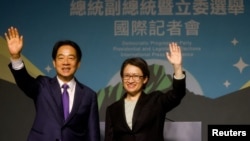China has initiated a series of influence campaigns against Taiwan ahead of the island’s inauguration of president-elect Lai Ching-te on May 20. Beijing has increased the scale and frequency of military activities near Taiwan while partially relaxing travel and import restrictions.
Some analysts say Beijing is trying to test how the incoming Taiwanese government will respond to the increased pressure from Beijing while further eroding the longstanding status quo across the Taiwan Strait at a time when Taiwan is preparing for a transition of power.
“In the short term, Beijing is trying to see how the new Taiwanese government under Lai may respond to its pressure campaign,” said Chen Fang-yu, a political scientist at Soochow University in Taiwan.
“At the same time, the Chinese government is attempting to change the status quo across the Taiwan Strait when Taipei is focusing on the inauguration,” he told VOA by phone.
Taiwan’s defense ministry detected 26 Chinese military aircraft and five Chinese naval vessels near the island between May 2 and May 3, including 17 Chinese military aircraft crossing the median line of the Taiwan Strait. Some Chinese aircraft got as close as about 76 kilometers from Taiwan’s northern port city of Keelung, which hosts an important naval base.
Meanwhile, the director general of Taiwan’s National Security Bureau, Tsai Ming-yen, told Taiwanese lawmakers on May 1 that the Chinese military had incorporated new tactics into its joint combat readiness patrol near the island, including staging night-time combat patrols and using landing ships and minesweepers during these exercises.
Additionally, he said Taiwanese authorities are tracking the increased patrols carried out by the Chinese coast guard near Taiwan’s outlying island, Kinmen. On April 29, Beijing said the Fujian Coast Guard had organized a fleet of ships to increase the frequency of patrols in waters near Kinmen since April.
Beijing also announced plans to allow residents from its southern province of Fujian to travel to Taiwan’s outlying island of Matsu while lifting import restrictions on Taiwanese pomelos and two types of seafood late last month.
The news came after a group of lawmakers from Taiwan’s main opposition party, the Kuomintang, which advocates closer ties between Taipei and Beijing, visited China.
Some experts say the measures rolled out by Beijing in recent weeks are all part of its influence operation against Taipei, which involves using disinformation campaigns, economic coercion, and gray zone operations to impose pressure on Taiwan.
“China’s overall strategy is still to increase pressure on Taiwan but they are also offering some small favors to Taiwan’s opposition parties,” said Su Tzu-yun, a military expert at the Taipei-based Institute for National Defense and Security Research.
While recent developments should be viewed as part of China’s overall influence operation against Taiwan, Su said part of Beijing’s long-term goal is to increase its control over the Taiwan Strait.
“By increasing the frequency of deploying Chinese coast guard vessels to restricted waters near Kinmen and flying Chinese military aircraft closer to Taiwan’s main island, Beijing is hoping to eventually turn the Taiwan Strait into its territorial water,” he told VOA by phone.
Beijing has repeatedly threatened to achieve reunification with Taiwan through force in recent years, and the Chinese government views Taiwan’s president-elect Lai as an advocate of Taiwan independence.
Since the Chinese military usually concentrates military exercises between June and November, Su said the incoming Taiwanese government needs to closely monitor any increase in Chinese military activities around the island after May 20.
In addition to threats posed by a possible buildup of Chinese military activities, some security analysts say Taiwan should also be mindful of Beijing’s efforts to create division in Taiwan’s domestic politics.
“There is every reason to believe that [the Chinese Communist Party] is ramping up efforts to use Taiwan’s democracy against itself,” J. Michael Cole, a Taipei-based security analyst, told VOA in a written response.
He said China will rely on China-friendly political forces in Taiwan to “sabotage the Lai administration” and these efforts will have “serious ramifications for Taiwan’s ability to counter Chinese infiltration and the Taiwan government’s ability to function.”
Prioritizing policy continuity
In light of the increasing Chinese pressure, Lai has appointed some current cabinet members to key positions in charge of national security, foreign policy, and cross-strait relations in his cabinet.
Taiwan’s current foreign minister Joseph Wu will be the secretary general of the National Security Council. The current head of the council, Wellington Koo, will be the new defense minister in the Lai administration.
On the foreign policy front, the current secretary general of Taiwan’s presidential office Lin Chia-lung will be the new foreign minister, and Chiu Chui-cheng, a former deputy political minister for Taiwan’s Mainland Affairs Council, which handles cross-strait relations, will be the new head of the council.
Cole said Lai’s personnel picks for national security and foreign policy reflect his intention to continue the policy agenda of the outgoing administration under President Tsai Ing-wen, who has focused on strengthening Taiwan’s relations with like-minded democracies including the United States and Japan.
The decision “will play a major role in reassuring allies and partners around the world that Taiwan will remain committed to the kind of responsible foreign policy that existed under the Tsai administration,” he told VOA.
Chen at Soochow University said the incoming Taiwanese government’s cabinet lineup will benefit the U.S.-led efforts to strengthen security-related cooperation among democratic countries in the Indo-Pacific region.
“Since some of his cabinet members are holdovers from the current administration, they have already established relationships with officials in other countries, and some of the existing cooperations can continue,” he told VOA.




